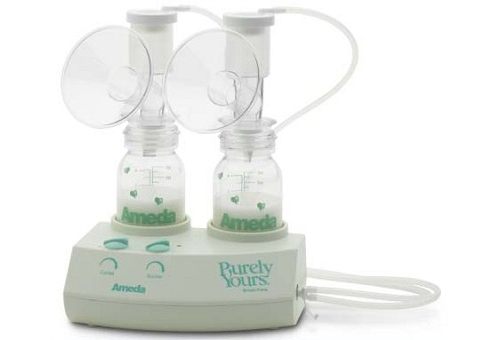or many new mothers, knowing when and how to
stop breastfeeding is difficult, especially if they’ve just had their
first baby. No one wants to breastfeed their child longer than they
should but no one wants to put their baby on the bottle before their
baby is ready. In truth, there is no set time. Every baby and every
mother is different. While some would suggest letting your baby know
when he or she is ready, that isn’t always the best way to go about
things as giving up the breast is something many babies just aren’t
happy to do. So how do you know when the time is right?
 According to the American Academy of Pediatrics,
new mothers should breastfeed for at least one year but many mothers
stop breastfeeding well before that. It’s important to remember the
reason breastfeeding is so important. Your breast milk offers your baby
important anti-bodies, helps prevent jaundice and helps baby have its
first bowl movement. Breast milk is rich in nutrients and is really just
the best stuff for your baby. With that said, the best breast milk is
the milk your baby gets when you first begin breastfeeding. After the
first few weeks, the thick, rich milk is replaced by normal breast milk
so if you find feeding from your breast painful, difficult or
uncomfortable and can’t continue after the first week or two, you’ve
already given your baby much of what it needs.
According to the American Academy of Pediatrics,
new mothers should breastfeed for at least one year but many mothers
stop breastfeeding well before that. It’s important to remember the
reason breastfeeding is so important. Your breast milk offers your baby
important anti-bodies, helps prevent jaundice and helps baby have its
first bowl movement. Breast milk is rich in nutrients and is really just
the best stuff for your baby. With that said, the best breast milk is
the milk your baby gets when you first begin breastfeeding. After the
first few weeks, the thick, rich milk is replaced by normal breast milk
so if you find feeding from your breast painful, difficult or
uncomfortable and can’t continue after the first week or two, you’ve
already given your baby much of what it needs.
Of course, the longer you breastfeed your baby, the longer you’ll have all that wonderful bonding time. In addition, breast milk, even after those first few weeks, is the healthiest thing a mother can feed her baby but regardless, you will need to stop eventually. Sometimes your baby will let you know when he or she is ready to move on. Your little one might start paying closer attention when others are eating or drinking from something other than a breast. If your baby starts being more interested in playing with your breast than latching on for feeding, starts turning away from your breast or only feeding from the breast for short periods of time, chances are he or she is trying to let you know that it’s time to move on.
 While
Baby may let you know the time has come to stop breastfeeding, your
body may also decide its had enough. Don’t feel guilty about that. Many,
many mothers experience this. Your body could start producing less and
less milk, eventually requiring you to offer something else to make sure
Baby is getting what he or she needs. Your nipples may start getting to
sore or, in all honesty, you may just get tired of doing it. There’s
nothing wrong with that either. This may especially be the case if you
have other children to care for, if you need to return to work or if
breast pumps just are too much of a pain to deal with. That’s all okay.
If you just don’t have it in you to keep going, as many mothers don’t
after a certain point, by all means, start weaning your baby off the
breast.
While
Baby may let you know the time has come to stop breastfeeding, your
body may also decide its had enough. Don’t feel guilty about that. Many,
many mothers experience this. Your body could start producing less and
less milk, eventually requiring you to offer something else to make sure
Baby is getting what he or she needs. Your nipples may start getting to
sore or, in all honesty, you may just get tired of doing it. There’s
nothing wrong with that either. This may especially be the case if you
have other children to care for, if you need to return to work or if
breast pumps just are too much of a pain to deal with. That’s all okay.
If you just don’t have it in you to keep going, as many mothers don’t
after a certain point, by all means, start weaning your baby off the
breast.
That brings us to the topic at hand – how to stop breastfeeding. Again, this is something that is going to differ from mother to mother. In most cases though, mothers find the most success when they wean their baby off the breast gradually. You’re probably going to feel a bit guilty because for many mothers, weaning the baby off the breast means denying their baby something it really wants. Your baby isn’t going to be happy about that and will probably be pretty adamant about voicing his or her upset. I can’t say this enough. The guilt you feel is entirely normal. You’re a mother now. No matter how uncomfortable or inconvenient breastfeeding is, you’re not going to want to allow your baby to be unhappy. Just remember that in the end, it really is the best thing for your son or daughter.
 Gradually
weaning your baby off the breast offers great advantages for you and
for your baby. Many mothers who try to just flat out stop breastfeeding
will find that they become engorged with milk which can be incredibly
painful. Don’t underestimate how smart your body is. When you cut back,
your body will recognize that you’ve stopped breastfeeding as often and
will slowly start to produce less milk. The benefit for Baby is pretty
obvious. Weaning allows you time to familiarize your baby with the taste
of formula and allows them time to understand that the breast isn’t
always going to be available.
Gradually
weaning your baby off the breast offers great advantages for you and
for your baby. Many mothers who try to just flat out stop breastfeeding
will find that they become engorged with milk which can be incredibly
painful. Don’t underestimate how smart your body is. When you cut back,
your body will recognize that you’ve stopped breastfeeding as often and
will slowly start to produce less milk. The benefit for Baby is pretty
obvious. Weaning allows you time to familiarize your baby with the taste
of formula and allows them time to understand that the breast isn’t
always going to be available.
Start slowly with your baby. Try replacing the breast with formula for one feeding a week. If there is someone in your life helping you raise the baby (a spouse, family member or something of that nature), you may want to try leaving the house entirely during feeding time. While your baby is likely going to be upset with your absence – and even more so when he or she realizes the breast has gone with you – you won’t be tempted to offer your breast right away to soothe baby if you’re not there to offer it. Try taking a little Mommy time. Every Mommy needs it, after all. Make sure you have a phone with you though or are somewhere you can easily be reached in case something happens. Make sure your partner knows though that contacting you should be the last resort. Advise your partner to try wetting Baby’s lips with the formula. That can sometime help encourage a hungry baby to eat.
 Of
course, even with gradual weaning, it’s a good idea to use your breast
pump every now and again. This not only helps relieve pain or discomfort
from full breasts but will also help you tell your body it’s time to
decrease the amount of milk being produced. This offers you the
additional benefit of storing some of your milk in case formula isn’t
your baby’s cup of tea right away. Some babies will not like the taste
of formula and will turn away from it. You can mix the milk you’ve
stored with the formula to help your baby enjoy the formula a little
more.
Of
course, even with gradual weaning, it’s a good idea to use your breast
pump every now and again. This not only helps relieve pain or discomfort
from full breasts but will also help you tell your body it’s time to
decrease the amount of milk being produced. This offers you the
additional benefit of storing some of your milk in case formula isn’t
your baby’s cup of tea right away. Some babies will not like the taste
of formula and will turn away from it. You can mix the milk you’ve
stored with the formula to help your baby enjoy the formula a little
more.
If you’ve gradually weaned your baby down so that most of the feedings are done by bottle but you can’t seem to give up the nighttime feedings, don’t stress yourself out about it. Many mothers choose to keep nighttime feedings with the breast because it allows for that special bonding time without keeping Baby entirely dependant on the breast. Listen to your body though. When you can’t produce enough milk to give your baby what it needs anymore, you’ll have to substitute formula for the breast.

source: deshow.net
Of course, the longer you breastfeed your baby, the longer you’ll have all that wonderful bonding time. In addition, breast milk, even after those first few weeks, is the healthiest thing a mother can feed her baby but regardless, you will need to stop eventually. Sometimes your baby will let you know when he or she is ready to move on. Your little one might start paying closer attention when others are eating or drinking from something other than a breast. If your baby starts being more interested in playing with your breast than latching on for feeding, starts turning away from your breast or only feeding from the breast for short periods of time, chances are he or she is trying to let you know that it’s time to move on.

source: today.msnbc.msn.com
That brings us to the topic at hand – how to stop breastfeeding. Again, this is something that is going to differ from mother to mother. In most cases though, mothers find the most success when they wean their baby off the breast gradually. You’re probably going to feel a bit guilty because for many mothers, weaning the baby off the breast means denying their baby something it really wants. Your baby isn’t going to be happy about that and will probably be pretty adamant about voicing his or her upset. I can’t say this enough. The guilt you feel is entirely normal. You’re a mother now. No matter how uncomfortable or inconvenient breastfeeding is, you’re not going to want to allow your baby to be unhappy. Just remember that in the end, it really is the best thing for your son or daughter.

source: picture-insights.blogspot.com
Start slowly with your baby. Try replacing the breast with formula for one feeding a week. If there is someone in your life helping you raise the baby (a spouse, family member or something of that nature), you may want to try leaving the house entirely during feeding time. While your baby is likely going to be upset with your absence – and even more so when he or she realizes the breast has gone with you – you won’t be tempted to offer your breast right away to soothe baby if you’re not there to offer it. Try taking a little Mommy time. Every Mommy needs it, after all. Make sure you have a phone with you though or are somewhere you can easily be reached in case something happens. Make sure your partner knows though that contacting you should be the last resort. Advise your partner to try wetting Baby’s lips with the formula. That can sometime help encourage a hungry baby to eat.

source: newparentgear.com
If you’ve gradually weaned your baby down so that most of the feedings are done by bottle but you can’t seem to give up the nighttime feedings, don’t stress yourself out about it. Many mothers choose to keep nighttime feedings with the breast because it allows for that special bonding time without keeping Baby entirely dependant on the breast. Listen to your body though. When you can’t produce enough milk to give your baby what it needs anymore, you’ll have to substitute formula for the breast.
0 comments:
Post a Comment